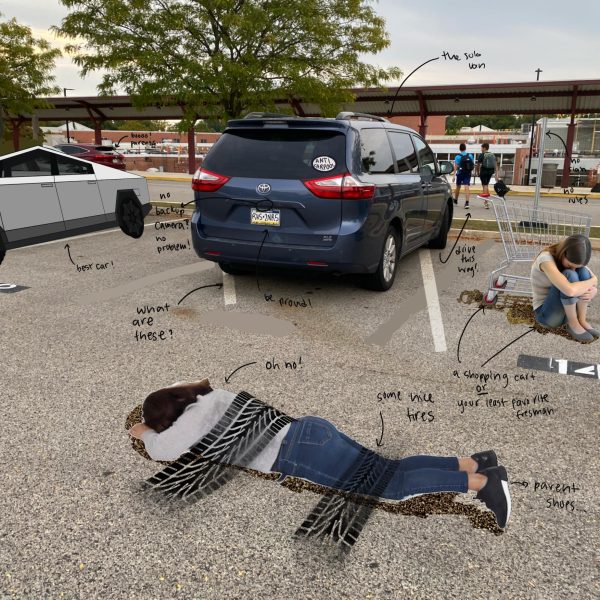Why I Marched
February 13, 2017
I walked past the Capitol Building. The white dome, which is normally surrounded by busy tourists, was surrounded by a sea of pink. Women stopped and took pictures, sticking it to “the man”. Outside the steps of the Capitol, we met a teacher from New York City; she told me and my friend that she was marching for her Muslim students. They were scared about what President Trump would do. She said, “I have to lie to them and tell them everything will be ok, when it’s really not”. Then she asked me and my friend why we’re marching today.
I mumbled something about LGBTQIA rights and equal pay, but I knew that wasn’t what really drew me to Washington. I thought back to where I first learned about what feminism is and what it means. Last year in Viewpoints, Mr. Rosin and Mr. Wright asked us if we considered ourselves feminists. The majority of my female peers around me raised their hands, but I didn’t because I didn’t understand the depth of the movement. I’m still grappling with it today. However, I really like the sentiment expressed by by Lindy West in her New York Times’s piece “Her Loss”,
I cried because I want my daughters to feel that blazing pride, that affirmation of their boundless capacity—not from their husbands, but from their world, from the atmosphere, from inviolable wells of certainty inside themselves. I cried because it’s not fair, and me and every woman I know is so tired. I cried because I don’t even know what it feels like to be taken seriously—not fully, not in that whole, unequivocal, confident way that’s native to handshakes between men. I cried because it causes you to always come second.
I’m tired, too. I want to feel like I belong and be surrounded by people who unequivocally support me. To say that women of all races, backgrounds, and identities do not face a significant hurdle in today’s world is an understatement. “Not fair” isn’t a strong enough word to use anymore. Everyone woman is tired today but my exhaustion stems more from the “plight of the modern women”.
Second semester is here, but I don’t find out my “fate” until April 1st. I’m tired of the collegiate expectations placed on me by myself, my family, and my school. The main reason for my Senioritis is pure exhaustion; the last three years have been grueling. Sure, school is tiring and sometimes boring, but the exhaustion with my “transitional state” also concerns my identity. I’m getting impatient.
A few weeks before the march, I decided to give my hair subtle pink stripes. I’ve seen the “look” on Hollywood starlets and on funky confident women. At the women’s march, there was going to be a large display of female power, and I’ve seen dyed hair that makes people look stronger. I thought of my confident cousin and her subtle orange stripes and the woman on my Frisbee team who has purple stripes in her ponytail. There appeared to be a loose connection between hair dye, feminism, and empowerment, and I wanted to be a part of it.
The next day, I came into school wearing my hair down. My subtle pink tufts of hair peered out of dark blonde. A peer walked up to me and asked, in what I perceived to be a condescending tone, “Did you dye your hair for feminism?” Now, this peer is a very smart friend. He attended the Women’s March on Washington, actively follows US politics, and can recite every part of the United States Constitution. But he had the audacity to question my appearance and my feminist beliefs. Sure, I laughed it off and rolled my eyes at his dig. But it hurt. We’re all at a time where we are trying to find our “identity” and I was taking a small step. Then I stuttered and fell down.
I had no response to his question, because the question itself implies sexism. Why do I have to rationalize my feminist beliefs to my male peer? If the roles were reversed, and there was a men’s march on Washington, no one would expect you to rationalize why you were attending the march. But because I am female, and my rights and body are considered “second class” to men, I have to rationalize why I am feminist.
As a privileged woman, I don’t face the same struggles as women of color, women from different socio-economic backgrounds, or women who fall into the LGBTQIA community. But no women should be mocked or feel compelled to rationalize their beliefs to their peers. So, I marched.
January 20th, 5:00 am and my friend and I board a rally bus headed to Washington D.C. When I arrive; I step off the bus and begin to walk towards the mall. I witness a parade of signs:
Pinky pussy hats
Beautiful uteruses, ovaries, and vaginas artistically painted on signs F**k the patriarchy
53% of white women voted for Trump
White feminists will you be at the next Black Lives Matter protest?
Sisters not cisters
My body my rules
Say no to racism, xenophobia, and sexism
It’s been three weeks since the Women’s March on Washington. Several friends have asked me if I am going to dye my hair again; I even got a recommendation for stronger hair dye. But I haven’t, and I don’t know why. Maybe I’m second guessing my ties to the women’s movement or just feeling extra insecure. I could be still trying to find myself. But I have hope that I will dye my hair again. Today’s just not that day. I’m too tired.






